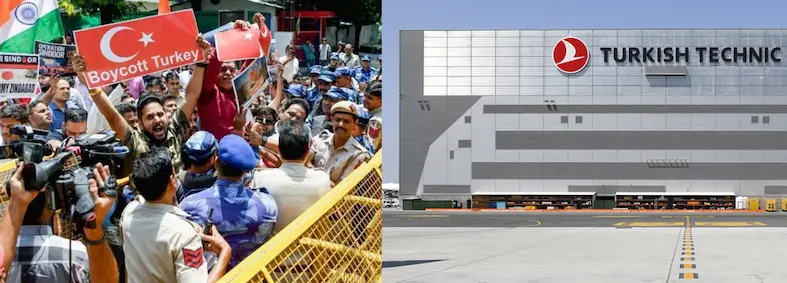
Air India is reconsidering its aircraft maintenance partnership with Turkish Technic amid Turkiye’s pro-Pakistan stance
Air India, India’s flagship carrier, is reconsidering its long-standing maintenance partnership with Turkish Technic, a leading aircraft maintenance provider based in Turkiye. This strategic shift comes in response to Turkiye’s vocal support for Pakistan in recent geopolitical developments, prompting concerns over national security and economic dependencies. As India-Turkiye relations face turbulence, Air India is exploring alternative maintenance solutions to ensure operational efficiency while aligning with national interests.
Background: Turkiye’s Pro-Pakistan Stance
Turkiye has been increasingly vocal in its support for Pakistan, particularly in international forums. Recently, Ankara condemned India’s counter-terror operations across the border, sparking diplomatic tensions. This stance has led to heightened scrutiny of Turkish firms operating in India, including Turkish Technic, which has been responsible for maintaining Air India’s wide-body aircraft.
The Indian government has already taken steps to limit Turkish influence in critical sectors. On May 15, the Bureau of Civil Aviation Security (BCAS) revoked the security clearance of Turkish ground-handling company Celebi Airport Services India Pvt Ltd, citing national security concerns. Additionally, IndiGo Airlines has been directed to terminate its lease agreement with Turkish Airlines by August 31, further signaling India’s strategic distancing from Turkish aviation firms.
Air India’s Maintenance Strategy Shift
Air-India has historically relied on Turkish-Technic for the heavy maintenance of its Boeing 777 and 787 aircraft. However, in light of recent developments, the airline is actively exploring alternative Maintenance, Repair, and Overhaul (MRO) providers in regions such as the Middle East, Southeast Asia, and the United States.
According to Air India CEO Campbell Wilson, the airline is “cognizant of national sentiment” and will gradually reduce its reliance on Turkish-Technic while transitioning to other MRO entities. This shift, however, is expected to take time due to logistical challenges and the limited availability of high-quality MRO facilities within India.
Impact on Air India’s Operations
The recalibration of Air India’s maintenance strategy will have several implications:
- Operational Adjustments – Air-India will need to reroute aircraft maintenance schedules, potentially leading to temporary disruptions.
- Cost Considerations – Transitioning to new MRO providers may result in increased costs, especially if maintenance is outsourced to regions with higher labor expenses.
- Strategic Autonomy – Reducing dependence on Turkish firms aligns with India’s broader push for strategic autonomy, ensuring that critical aviation operations remain unaffected by geopolitical shifts.
Despite these challenges, Air India remains committed to ensuring seamless operations while prioritizing national interests.
India’s Push for Domestic MRO Capabilities
One of the long-term solutions to Air-India’s maintenance concerns is the development of domestic MRO infrastructure. India has been making strides in expanding its aviation maintenance capabilities, with Air-India Engineering Services Limited (AIESL) playing a crucial role in servicing narrow-body aircraft. However, wide-body aircraft maintenance still requires significant investment and expertise.
The Indian government is actively encouraging private-sector participation in the MRO industry, aiming to reduce reliance on foreign entities. With Make in India initiatives gaining momentum, the future of domestic aircraft maintenance looks promising.
Conclusion
Air India’s decision to reassess its partnership with Turkish-Technic marks a significant shift in India’s aviation strategy. As geopolitical tensions between India and Turkiye escalate, the airline is prioritizing national security and strategic autonomy by exploring alternative maintenance solutions. While the transition may pose short-term challenges, it aligns with India’s broader vision of self-reliance in critical sectors.
Also read – Russia Offers Su-57E to India with Full Tech Transfer: A Transformative Boost for ‘Make in India’